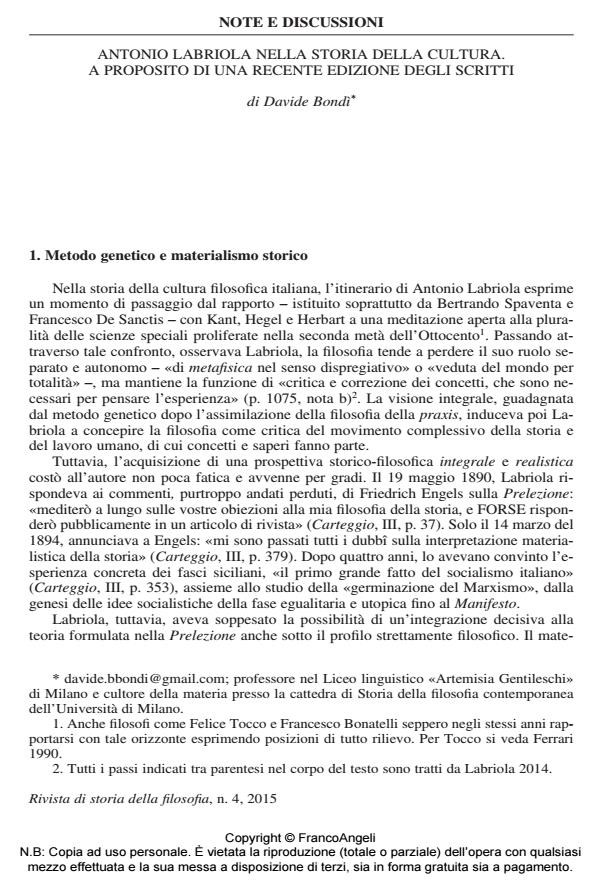Antonio Labriola nella storia della cultura. A proposito di una recente edizione degli scritti
Titolo Rivista RIVISTA DI STORIA DELLA FILOSOFIA
Autori/Curatori Davide Bondì
Anno di pubblicazione 2015 Fascicolo 2015/4
Lingua Italiano Numero pagine 9 P. 807-815 Dimensione file 529 KB
DOI 10.3280/SF2015-004005
Il DOI è il codice a barre della proprietà intellettuale: per saperne di più
clicca qui
Qui sotto puoi vedere in anteprima la prima pagina di questo articolo.
Se questo articolo ti interessa, lo puoi acquistare (e scaricare in formato pdf) seguendo le facili indicazioni per acquistare il download credit. Acquista Download Credits per scaricare questo Articolo in formato PDF

FrancoAngeli è membro della Publishers International Linking Association, Inc (PILA), associazione indipendente e non profit per facilitare (attraverso i servizi tecnologici implementati da CrossRef.org) l’accesso degli studiosi ai contenuti digitali nelle pubblicazioni professionali e scientifiche.
In this essay is presented the edition of a short tract of natural theology based on the only two extant copies preserved in mss. Praha, Národní knihovna, V.F.9, ff. 68v-75v and Wien, Österreichische Nationalbibliothek, 4937, ff. 28r-34v. It is introduced by a historical and philological note. A defence of John Wyclif’s views on future contingents condemned at the Council of Constance in 1415, the tract turns out to be a startling profession of crude determinism, so radical that it would hardly have been upheld by Wyclif even in his later and most controversial writings. The anonymous tract can be plausibly ascribed to Peter Payne, an Oxford Wycliffite who left England possibly to escape prosecution and reached Prague only after Hus’s departure for Constance (11 October 1414). Probably composed from late 1419 to early 1420, when Wyclif’s theological views were the object of harsh criticism by many masters at the University of Prague, the tract has a literary form similar to that of a determinatio, the answer given by a master to a question at the end of a disputation. Hence, it contains eighteen arguments in support of Wyclif’s thesis that "everything that will come to pass, will come to pass by absolute necessity" and six arguments against this thesis, followed by relevant rejections. As to the writing technique, Payne draws a significant amount of textual materials from several sources without citing them: namely Wyclif, Thomas Aquinas, and Jan Hus.
Parole chiave:Peter Payne, John Wyclif, Jan Hus, University of Prague, Hussitism
- La Prelezione nell'Edizione Nazionale delle Opere di Antonio Labriola Davide Bondì, in RIVISTA DI STORIA DELLA FILOSOFIA 1/2020 pp.115
DOI: 10.3280/SF2020-001006
Davide Bondì, Antonio Labriola nella storia della cultura. A proposito di una recente edizione degli scritti in "RIVISTA DI STORIA DELLA FILOSOFIA" 4/2015, pp 807-815, DOI: 10.3280/SF2015-004005